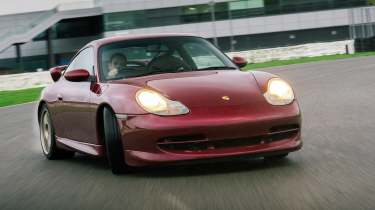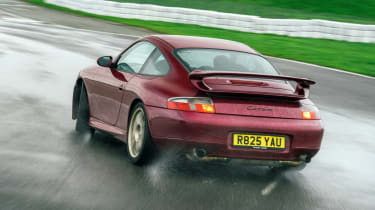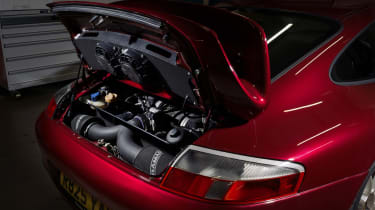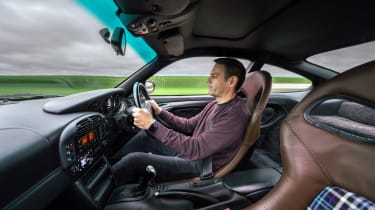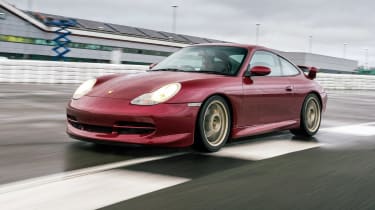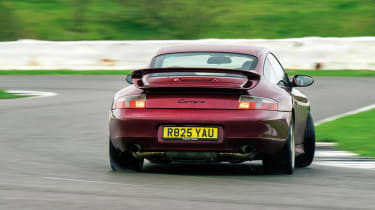Porsche 911 Carrera '996.3' – Jethro Bovingdon's re-engineered 911 driven
Re-engineering a 996 Carrera with a 991 engine and a chassis to match made no financial sense whatsoever, and Jethro Bovingdon couldn’t be happier
It started with a little misfire. My Porsche 996 was in daily service at the time and it idled beautifully, delivered strong mid-range torque, didn’t burn a drop of oil and sounded great. But at about 6500rpm it would stutter and go flat, then labour to the red line. I changed coil packs, lambda sensors and all the easy, little stuff. The misfire lessened slightly but it was still there. It was annoying but not disastrous. So I soldiered on for a few busy weeks and several hundred miles, a sense of dread hanging over me but optimism, too. How could it pull like a train in the mid-range if there was something seriously wrong?
Of course, there was something seriously wrong. Something that would require a strip-down to fully diagnose. At which point you’re into a rebuild and the slippery slope to financial ruin. But then options open up, and so many of them for 996 owners thanks to the entire industry that’s grown up around repairing some of the maladies of the M96 engine. The most prolific engineering company repairing, enlarging and improving these engines is Hartech, based in Bolton, Greater Manchester. A 3.7-litre upgrade with Nikasil cylinder liners seemed a good plan. Then I decided the impossibly rare 3.4-litre M96 with the optional X51 Powerkit would suit my needs more. Less torque but more revs. Porsche Classic could help… but the price was eye-watering.
More reviews
> 2023 Porsche 911 GT2 RS Clubsport Evo revealed
This was all happening back in 2018. That must be, what, eight prime ministers ago? Nobody had even heard of Covid. However, some things never change. So, as plans were formulated and then crumbled away one after the other, I called Iain Litchfield. I trust Iain; I know he’s as honest as they come. I also love his high standards and passion for engineering. So I sent my Porsche to Litchfield and embraced financial ruin with a much bolder new plan. Fit a 3.8-litre direct-injection flat-six from the 991.1 Carrera S into my often abused but always cherished 996 Carrera. The car arrived at its new temporary home in May 2020.
And now it’s back. Just like that. I collected it on 3 November 2022 and in so many ways it’s a completely different car. There are some really cool upgrades quite apart from the new engine. For example, it has rose-jointed RSS Tarmac Series suspension arms, new KW Clubsport coilovers, Eibach hollow anti-roll bars, refurbished brake calipers with new discs and Pagid RS pads, and it’s been resprayed at Litchfield and then protected with the latest Gyeon PPF by Ti22 Vehicle Services. The OZ Racing wheels are now finished in ‘Weissgold’. It’s never looked better or had so much good hardware underneath it.
There are new seats, too. Made to order by Corbeau, they have the high-winged GT3 look I wanted and the reassurance of being built by a proper company instead of being unknown eBay ‘fakes’. I’ve even had the seat cushions trimmed by the good people at Workshop 5001 in Los Angeles. Their first car, ‘No1’, was a gorgeous Nardo Grey ’73 911 with a 3.4-litre engine, steel wheels and a deep-seated star quality. I drove it back in 2017 and fell for it in a big way. Its custom tartan trim looked fantastic, too. Now I have a little bit of Workshop 5001 in my own 911 ‘hot‑rod’.
Dropping into the driver’s seat, so much is familiar. You sit really low, backside skimming the road surface. However, unlike in the 991 or 992 GT cars, which share that sensation, the 996 doesn’t sprawl out around you. It feels compact in every dimension. I love the slim feel of the gearshifter, too. Even if it seems to be mounted a little too low and the throw itself is quite long. The steering wheel needs a wider range of adjustment, so you have to choose between having your legs bunched up or the wheel a half-stretch away. It’s a good reminder that I need to order the dished Momo Mod 07 steering wheel as used in the 996 Cup cars. So much has gone into the mechanical transformation of this car that the interior is very clearly a weak spot. The black leather is worn – shiny in parts and scuffed in others. It used to really bother me but doesn’t seem quite so important now.
So, the Carrera – can I call it the 996.3, or maybe the Litchfield Type 38? – still feels like my car. But the changes come thick and fast from hereon in. Turn the key and the new direct-injection 3.8-litre flat-six bursts into life. The noise is tighter, more highly strung and less breathy than the sometimes slightly flatulent-sounding M96 engine. It helps that this car has a simply gorgeous exhaust created by a genius in this field, Elliot Cuthbert-Brown of Elweld Fabrications.
My brief to Elliot was ‘not too loud but with flames’, but luckily Elliot is rather more serious. ‘I’d suggest using some of the space provided by losing the heavy, unwanted side silencers and creating a long-run set of headers. These can connect to a rear box with a crossover to balance the banks. A bit like a GT3 system,’ he said. I nodded, sagely. Then left him to experiment for weeks with various configurations.
Elliot takes up the story: ‘We decided to use 321 stainless for the headers as the engine temps didn’t warrant the use of Inconel and we could still reduce the overall weight by manufacturing the tube from flat sheet, 1mm thick. By routing the manifolds up into the wheelarch we achieved an equal longer primary length to help increase torque at lower revs. This was then linked to proper merge collectors and back down to the rear silencer section. ASNEX titanium is a good way to go here, as we can shed some weight right at the back of the car.’
The final, gloriously serpentine system is outrageous and cost roughly what I paid for the entire car back in 2013. It is art, pure and simple, and creates drama even at idle. My 996 now shimmies with that flat, fast-paced note familiar from modern Porsche GT cars. So much more exciting than a 996 Carrera but slightly more mannered than an early, gravel-gargling 996 GT3. And that’s just the start…
There are other differences of note; less dramatic, perhaps, but extremely pertinent to the feel and dynamics of the car. For example, the physical throttle pedal is from the donor 991 Carrera S (my car had a cable throttle) and its travel feels maybe 25 per cent shorter. It’s literally years since I last drove the 996 but it immediately clashes with my muscle memory. No complaints about the throttle response, though. There’s a slightly less organic feel than previously, just as there would be comparing the old car’s set-up with a 991 or 992’s, but I’m already used to it and response remains extremely accurate. Such is the performance on offer now that it seems even quicker to respond, in fact.
Another huge change is the adoption of a 996 Cup electric steering pump, as there was no way to run a hydraulic pump from the new engine. Lighter and without the usual power-scavenging traits of a hydraulic pump, it seems the perfect solution. However, you play around with the feel of 996 steering at your peril! It’s such a highlight of the car. Luckily, most of the texture has been retained and although the steering requires less effort it’s still worlds better than a modern ePAS system. I’d like to investigate a way to slightly reduce the assistance as it’s clearly set up for slicks and lots of camber. If we can do that then I’m confident the full 996-spec steering sensation will return undimmed. My car might be ‘finished’ but Litchfield really wants to keep honing it over the coming weeks and months, so this is one area we’ll look at.
As speeds rise, the quality of the work already completed is tangible. As mentioned, the 996 now rides on KW Clubsport coilover suspension, which features 16 clicks of rebound adjustment, plus separate high- and low-speed bump adjustment. In conjunction with the new suspension arms it’s a pretty hardcore set-up. Too much? I don’t think so. Whilst the ride is firm there’s an almost spooky ability to round-off nasty bumps, and just when you think the car might bottom or thwack against the bump-stops, it just glides onwards. However, really big compressions are an issue and I think it’s linked to the adjustable Eibach anti-roll bars. At the moment it’s catching too much air and the transition from the smooth control of the dampers to suddenly being flung upwards can be disconcerting. It’s another area we need to play around with.
I am trying to be really objective about this stuff, just as I would be with a new car. Maybe more so. Hence the little quirks or faults that I’m highlighting. In the main, the 996 is absolutely fantastic. The engine is a free-breathing monster and I suspect there’s even more to unlock. Litchfield utilised a sophisticated motorsport ECU, the Syvecs S12, in order to make all the old analogue systems work with the 991 digital architecture and that meant mapping the engine completely from scratch. There was no ‘base’ map to work from and tweak and so the process was intense. Dan Cook, who mapped the car and spent weeks working on deeply frustrating issues such as making the air-conditioning work through the Syvecs, has done a terrific job and the 996.3 makes 386bhp at 7425rpm and 308lb ft at 5875rpm. For reference, the discarded 3.4 was claimed to produce 296bhp at 6800rpm and 258lb ft at 4600rpm. The 9A1 engine is a little lighter and that incredible exhaust has helped, too, so with a full tank of fuel the 996.3 weighs 1367kg (Porsche claimed 1320kg for the 996.1).
For me the biggest highlight is the OEM+ feel of the car. It is wildly faster than before but the chassis doesn’t feel overpowered. The suspension is much more track-capable and sophisticated than the previous (and already very good) Bilstein PSS9 set-up, but the car still works well on the road and, although there’s more road noise thanks to the rose-jointed arms, the car wouldn’t be a bind at all on a long journey. Maybe to somewhere in Germany, for example. It’s certainly much more useable and quieter than, say, a new GT4 RS.
Okay, okay… so what about that engine and the effect it has on the chassis? Well, it really just exaggerates all that’s so good about the car already. The 996 is such a small and relatively light car and that encourages a much more exuberant driving style on the road than you could ever adopt in a new GT3. You can float it into corners on the brakes, feel the rear start to break away and then tidily gather it up or prolong the angle. With so much smooth, accurately delivered power, it feels like you have endless options and that you can explore them on British roads without constantly thumping over catseyes or veering over the centre line. It’s just so controllable.
Having said that, I have had to adapt my driving style. Whilst the 996 now has 991 Carrera S power, it doesn’t have 991 Carrera S levels of grip and traction. In damp or wet conditions the car is much more likely to shimmy under full power in a straight line in second or third gear and I have to remember not to just flatten the throttle. There is assistance should I choose to lean on it: that amazing Syvecs ECU also has programmable traction control. The default setting is ‘off’ but I can hook the car up to the Syvecs Pro app on my phone and activate various levels of traction control. It’s a really cool system and makes the Porsche sounds like an old F1 car, popping and crackling as power is cut to keep a precise level of slip. It’s another area I’ll work on with Litchfield to try to hone various settings ranging from ‘my dad has to drive the car for unknown reasons’ to ‘I’d like to set a lap time at the Ring’.
So in summary, I am very, very happy and this story is far from over. Of course, there are those who won’t get it. For very good reasons: this project makes no financial sense whatsoever; it’s still not a GT3; it’s ‘only’ a 996 and hence not as special as an air-cooled car (I disagree, but whatever); the car will never realise the value of investment. However, none of that matters to me. When my car needed either substantial work or to be thrown in the bin, I didn’t feel like I had a choice. It’s my 911. My first Porsche. A car that I bought in an extremely dark time in my own life to give me some joy and excitement. And now? Now, it’s so much more. Thank you Iain and all the brilliant people at Litchfield. My 911 is back and, to me, it’s just about perfect. To be continued…
Porsche '996.3' 911 Carrera specs
| Engine | Flat-six, 3800cc |
| Power | 386bhp @ 7425rpm |
| Torque | 308lb ft @ 5875rpm |
| Weight | 1367kg |
| Power-to-weight | 287bhp/ton |
| 0-62mph | c4.5sec (est) |
| Top speed | c180mph (est) |
This story was first featured in evo issue 307.

